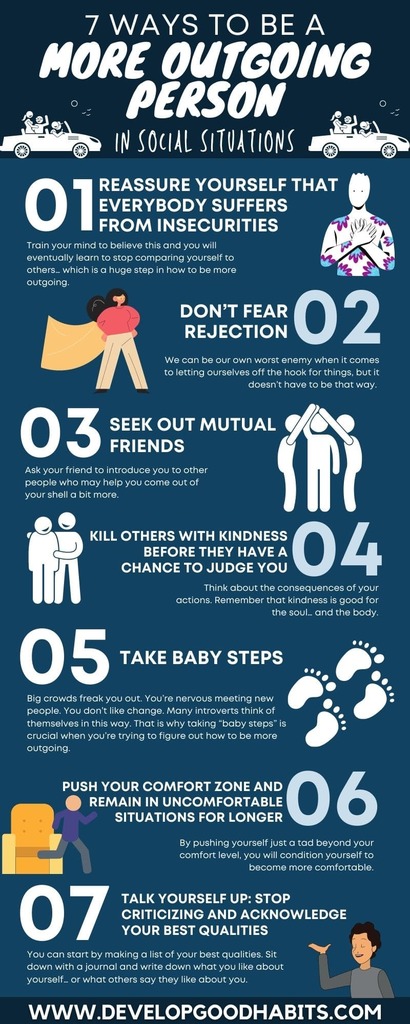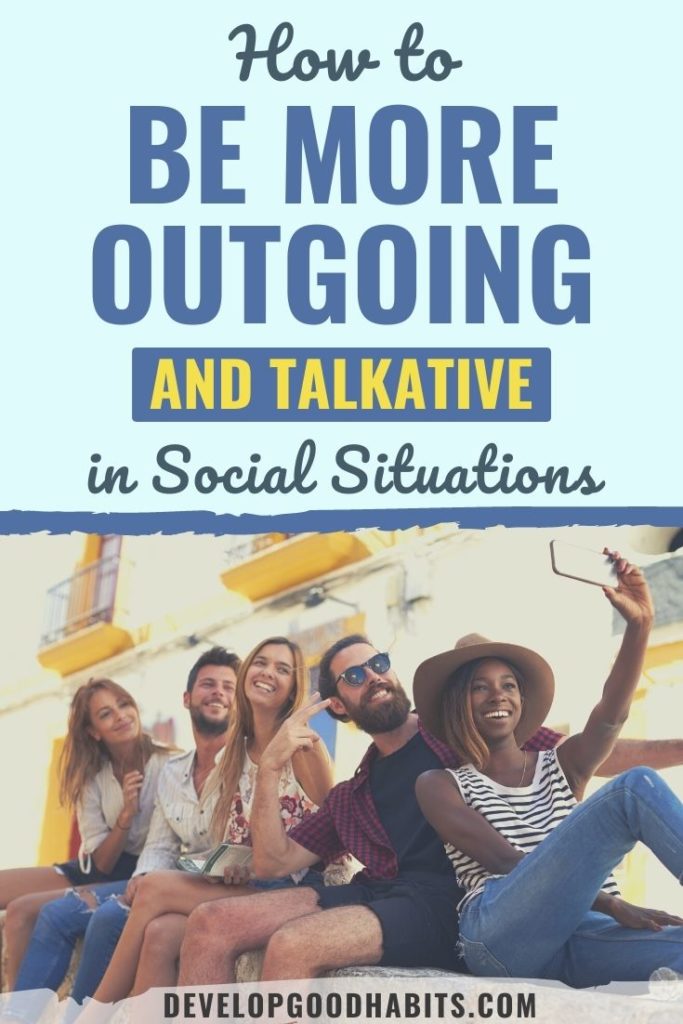Do you have that one friend or family member who is always outspoken? Sociable? Confident? The person other people seem to flock towards? The one who typically gets what they want?
Do you ever wish you could be more like them? There is no shame in secretly wishing you could be like somebody else… even just some of the time. But there is also no shame in being a reserved, even-tempered, or shy person. Nor is there any shame in being content with the quiet at times or avoiding certain small talk situations in public.
There is a time and a place for every social behavior and emotion. While outgoing people may appear to have it all figured out on paper… they sometimes run the risk of coming across as overbearing, rude, or simply trying too hard when it comes to any social interaction.
Whereas the more conservative, introvert types are sometimes perceived as being pushovers or complacent. And while neither may be true, perception is often everything.
So, if you want to make the most of your life, be it personally or professionally, you’re likely to have to be a little more assertive at times and learn how to best take social cues.
In this article, I will provide 8 steps to help you learn how to be more outgoing and talkative when the time calls for it.
1. Reassure Yourself That Everybody Suffers From Insecurities
Nobody is perfect. Everybody has doubts and fears. Train your mind to believe this, and you will eventually learn to stop comparing yourself to others… which is a huge step in becoming more outgoing. Think about it.
If you make an effort to look more closely at an outgoing person, there is a good chance you will see that they are trying to overcompensate for some insecurity. Maybe even two.
For instance, I am on the short side. Five feet tall, to be exact.
I would often use humor in grammar school to make myself feel more noticed. I made people laugh all of the time and often got into trouble in class… all because I wanted the same attention I felt the taller, prettier girls were getting.
I was outgoing for all intents and purposes, but it was driven by insecurity. As I grew older, I started to make friends with different kinds of people and quickly found that height doesn't matter… unless you want to play for the NBA.
I had tall girlfriends who hated that many boys were shorter than them. And, because of it, they were quiet. Didn’t date much. Once I was able to recognize the insecurities in myself and others, I was able to focus on who I really was… and who I wanted to be.
I was an incredible athlete. Size be damned!
I was smart.
I was still funny.
I was kind.
I never judged anyone and had no specific criteria for choosing friends.
So, if you’re feeling inferior, take a cue from me and look at who and what is making you feel that way. I promise that the minute you do, a weight will be lifted, and you’ll be able to take one more step out of your shell.
2. Don’t Fear Rejection
We are often afraid to step out of our comfort zone for fear of being rejected.
What if they don’t like me?
What if they think my idea is stupid?
What if I don’t get the job?
What if I fail?
The thing is… even if you make an utter fool of yourself for taking a shot at something, it’s unlikely anybody will remember it. At least not for long enough to have any real impact on your life. We can be our own worst enemy when it comes to letting ourselves off the hook for things, but it doesn’t have to be that way.
You are who you are. And as long as you give it your all… you’ve succeeded. Made strides. Gained confidence. If someone doesn’t accept you for who you are… that’s on them. And they are most likely not worth your time or effort to try and prove otherwise.
Move forward. Never look back. The rest will follow.
3. Seek Out Mutual Friends
If you have an outgoing friend or colleague… chances are they have some outgoing friends themselves. What does this mean for you?
You can ask your friend to introduce you to other people who may help you come out of your shell a bit more. It’s the simple law of diversification… and it works.
People in finance talk about diversifying portfolios. Companies seek diversity in their employees. The world would be quite boring if everybody were the same.
Having some differences from others can bring out the best in us… especially when it comes to forming meaningful and lasting relationships.
The more effort you put into meeting and engaging with people different from you… the more likely you are to migrate towards change. And the less you’ll be afraid of it.
Look at what makes your friends tick. Then, figure out what would work for you and what wouldn’t. Whatever path you choose, just make sure you have more than one type of friend to follow it along with.
4. Kill Others With Kindness Before They Have a Chance to Judge You
There will come a time in your life when that outgoing person you admire will reveal a character flaw. One that makes them seem mean or catty. Jealous.
And when that time comes, you may find yourself questioning your opinion of them and re-evaluating the relationship. It happens all of the time.
People fall from grace when their friends or family see that side of them they may have never known was there. But it was. It was always there… disguised in a larger-than-life demeanor.

So if you are worried about what others may think of you, and it’s holding you back from being more outgoing, remember this: it’s nearly impossible not to like a genuinely kind person. Or at least someone trying to be kind.
You can still be fun, outspoken, confident, and charismatic, but use those powers for good.
Don’t exclude people from your inner circle that may benefit from your friendship.
Offer help to those who need it.
Consider other people’s feelings. Think about the consequences of your actions.
Remember that kindness is good for the soul… and the body. If you prioritize that, everything else will fall into place on your journey to be more outgoing.
5. Take Baby Steps
Okay… so you’re shy. Big crowds freak you out. You’re nervous about meeting new people. You don’t like change. You follow but rarely lead. Many introverts think of themselves in this way. That is why taking “baby steps” is crucial when trying to figure out how to be more outgoing.
For example, don’t look to sign up for karaoke night to quell your public speaking fears… or jump out of an airplane to cure your fear of flying. You are who you are and like what you like… and that is okay. So, why the rush to be someone else? Take your time.
Say your goal is to be more assertive and ask your boss for a raise. It would be detrimental for you to barge into his office one afternoon and demand that he listen. Why? Because you would be nervous and emotional, perhaps a little frustrated and angry… and it wouldn’t be the productive conversation you were looking for.
Instead, compose your thoughts and try writing down what you want to say first. Then rehearse it in front of a mirror a few times. Next, practice saying it to your spouse or a friend.
The trick is to slowly work up the courage and confidence to address your employer. When the time is right to present your case, you’ll know it… and you’ll likely be glad that you waited.
Other small steps you can take on your journey to becoming a social butterfly can include making eye contact with others, smiling at people, and greeting other people. These small things can go a long way when establishing communication with strangers and acquaintances. The more you practice, the easier it becomes, and these steps will feel much more natural.
6. Push Your Comfort Zone and Remain In Uncomfortable Situations For Longer
Life is filled with uncomfortable situations. They are inevitable. It is how we handle them that defines us. Most outgoing people can roll with the punches and let things go. They don’t often get caught up in all of the negative energy and can move on fairly easily without giving things a second thought.
A bashful or timid person tends to self loathe and worry about things, including their facial expressions, body language, and other social behavior… even things they can’t control. She will walk into a room of people and assume that at least one of them won’t like her.
While that may not even be true, she’s already taken herself out of the game because of introversion and convinced herself that she’s not worthy of being among them or in their social circle for some reason.

If you want to be more outgoing and engage in more social activities, you will need to push the envelope a bit when it comes to your comfort zone. We have all experienced that moment when our nerves are getting the best of us… and we want to bail before making a situation more uncomfortable.
The difference is, outgoing people with social confidence often stick it out. Shake it off. But not an introverted person. They will retreat. That, or they won’t allow themselves to get into that situation in the first place.
If you want to change, force yourself to stick around when something makes you uncomfortable. This can be as simple as staying at a party just 20 minutes longer than you intended. Or being the first to say hello to someone you don’t know. One small step at a social event can make all the difference for an introverted person.
By pushing yourself just a tad beyond your comfort level, you will condition yourself to become more comfortable. It may not happen overnight, but it will.
7. Talk Yourself Up: Stop Criticizing and Acknowledge Your Best Qualities
One of the hardest things to do when you’re a little short on confidence is to build yourself up.
You likely find it easier to criticize yourself than acknowledge your good qualities.
The thing is… you have them. Plenty of them. You just need to make an effort to look deeper into yourself.
You can start by making a list of your best qualities. Sit down with a journal and write down what you like about yourself… or what others say they like about you.
If you’re having trouble coming up with stuff, you can always read over daily affirmations. These mantras will help get you in the right mindset to start the day.
Once you’ve come up with your list, you can keep it in your pocket or purse. Or store it on your phone as a daily reminder to keep you motivated and positive.
If you arm yourself with self-affirming weapons like these, you will be less likely to succumb to fear and more likely to be more outgoing… at least in certain situations.
Believing that you are good enough and likable is half the battle when you’re trying to figure out how to be more outgoing. They say the mind can play tricks on you… but it can also work magic if you let it.
8. Use Mutual Connections
While you are already comfortable hanging out with the people you know and are familiar with, it is time to branch out in your social and professional environments. One of the easiest ways to start becoming more outgoing and talkative is introducing yourself to a new person. Meeting a close friend of one of your current friends is a great way to practice and strengthen your social skills.
Once you have made a new connection with someone, start asking them about themselves. Strike up a conversation, ask open-ended questions, and actively listen. This helps strengthen your communication skills. Networking is a good way to connect with others based on shared interests and keeps the interactions within your social circle.
Overcoming Social Anxiety
Social anxiety may be at the forefront of why you may not be as outgoing or talkative as you would like to be. With that said, here are a few ways to help overcome social anxiety so you can flourish in any social situation and become a more confident person.
Speak With a Therapist
Our mental health is important, so when you feel anxious in a social setting, you may be experiencing a social anxiety disorder. This goes beyond shyness or just feeling nervous around new people.
Social anxiety is considered a mental health condition and may require some professional help. Group therapy and support groups allow you to practice social skills while interacting with other people in a group conversation setting who are also coping with their own social anxiety.
Explore Triggering Situations
Social anxiety displays in different ways for different people. It is important to pinpoint what makes you anxious, so you can take the steps to find a solution.
What situations make you the most uncomfortable? A job interview? Meeting with a teacher to ask for help? Maybe introducing yourself to someone you are attracted to? Note your symptoms during any social situation as well. Exploring these triggering situations can also help you develop your conversation skills and overcome social awkwardness.
Challenge Your Negative Thoughts
When you suffer from a social anxiety disorder, you may have negative thoughts pertaining to the possible negative outcome of any given social situation. To get over this, challenge those thoughts. One social blunder doesn't mean people will judge you and look down on you.
Practice Mindfulness
To combat feelings of anxiety and to overcome shyness, practice mindfulness. This includes meditation, using positive affirmations, or gratitude journaling. Mindfulness has been found to reduce the symptoms of social anxiety disorder, so you can feel less anxious in a social setting.
Final Thoughts on Being More Outgoing
If you read this article from start to finish, you are already ahead of the game when figuring out how to be more outgoing. Seeking help and advice means you want it. You want to be more outgoing!
You want to succeed personally and professionally in your life. You feel the need to widen your inner circle and experience new things. It will happen for you. I promise. But the trick is to remember that it won’t happen overnight… and that all good things are worth waiting for.
Be patient. Stay diligent on your journey. Don’t accept every invitation because that can be overwhelming. Recognize your own needs and limitations. Acknowledge your comfort zone and step gently outside.
Embrace your alluring qualities and get ready to share them with the world.
Fear no one and nothing. Be perceptive. You can implement all of the strategies outlined here… or pick and choose the ones you’re most comfortable with to start.
Do what is best for you in your own time, and you will get there. You will get there.

Nicole Krause has been writing both personally and professionally for over 20 years. She holds a dual B.A. in English and Film Studies. Her work has appeared in some of the country’s top publications, major news outlets, online publications, and blogs. As a happily married (and extremely busy) mother of four… her articles primarily focus on parenting, marriage, family, finance, organization, and product reviews.


